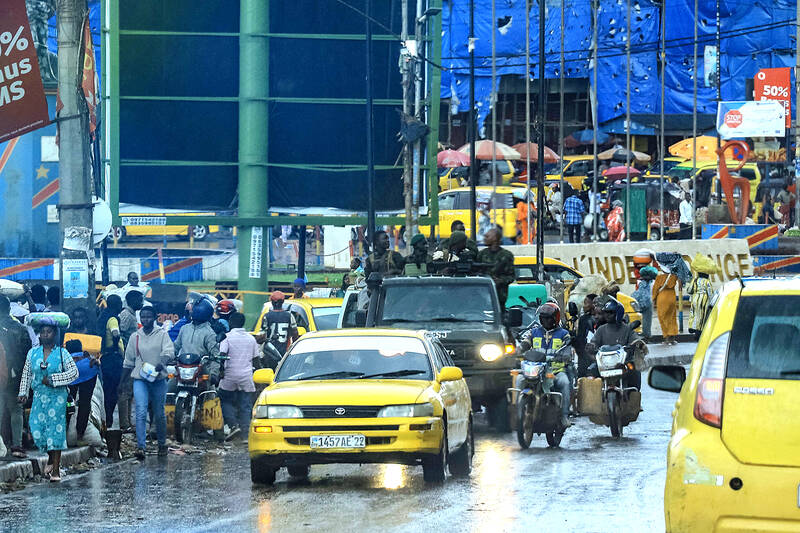Rwanda-backed rebels in eastern Democratic Republic of the Congo (DR Congo) entered the region’s second-largest city of Bukavu on Friday, local and civil society leaders said, the latest ground gained since a major escalation of their yearslong fighting with government forces.
The M23 rebels entered the city’s Kazingu and Bagira zone and were advancing toward the center of the city of about 1.3 million people, said Jean Samy, vice-president of the civil society in South Kivu.
He reported gunfire in parts of the city.

Photo: AFP
Videos posted online appeared to show rebels marching toward the Bagira area. In one of the videos, a voice in the background shouted: “They are there... There are many of them.”
Hours earlier, the rebels had claimed to have seized a second airport in the region, in the town of Kavumu, following a days-long advance, while the UN warned that the recent escalation of fighting with government forces has left 350,000 internally displaced people without shelter.
The M23, which is supported by about 4,000 troops from neighboring Rwanda, took control of eastern DR Congo’s biggest city, Goma, in late last month. The rebels are the most prominent of more than 100 armed groups vying for control of Congo’s mineral-rich east.
The rebellion has killed at least 2,000 people in and around Goma and left hundreds of thousands of displaced people stranded, the UN and Congolese authorities have said.
The Associated Press could not immediately confirm who was in control of the Kavumu national airport, which is located about 30km from Bukavu, which is the capital of South Kivu province. Government officials and civil society leaders did not immediately comment.
Kavumu airport became a target after the M23 rebels seized Goma and its international airport. Goma is a critical trade and humanitarian hub that hosted many of the close to 6.5 million people displaced in the conflict, the world’s largest humanitarian crisis.
M23 spokesperson Lawrence Kanyuka said on X that the rebels took over Kavumu airport and its surroundings to “eliminate the threat at the source.”
“The airport posed a danger to the civilian population,” he said.
The DR Congo Ministry of Transport and Channels of Communication issued a statement criticizing the rebels for violating a ceasefire that regional leaders have called for.
The rebels were “imposing an urban war by attacking the positions of the FARDC [Congolese military] who are keen to avoid bloodshed in Bukavu,” the ministry said.
A local civil society leader in Kavumu reported seeing soldiers “abandon their positions and head towards Bukavu.”
“This caused fear within the community, [and] I took the necessary measures to bring my family to safety,” the leader said, speaking on the condition of anonymity for fear of reprisals.
Congolese President Felix Tshisekedi criticized what he described as the failure of the international community to stop the aggression from the rebels and troops from Rwanda.
“This raises the question of the United Nations, which for me has become a two-tier organization depending on whether you are among the powerful or privileged [countries] or whether you are among the weak and disadvantaged,” said Tshisekedi, who is attending the Munich Security Conference in Germany.
The rebels’ latest advance caused chaos and panic among residents in different parts of South Kivu. Some were fleeing from Kavumu into the provincial capital of Bukavu, while others were emptying from Bukavu into neighboring towns.

Two Belgian teenagers on Tuesday were charged with wildlife piracy after they were found with thousands of ants packed in test tubes in what Kenyan authorities said was part of a trend in trafficking smaller and lesser-known species. Lornoy David and Seppe Lodewijckx, two 19-year-olds who were arrested on April 5 with 5,000 ants at a guest house, appeared distraught during their appearance before a magistrate in Nairobi and were comforted in the courtroom by relatives. They told the magistrate that they were collecting the ants for fun and did not know that it was illegal. In a separate criminal case, Kenyan Dennis

Incumbent Ecuadoran President Daniel Noboa on Sunday claimed a runaway victory in the nation’s presidential election, after voters endorsed the young leader’s “iron fist” approach to rampant cartel violence. With more than 90 percent of the votes counted, the National Election Council said Noboa had an unassailable 12-point lead over his leftist rival Luisa Gonzalez. Official results showed Noboa with 56 percent of the vote, against Gonzalez’s 44 percent — a far bigger winning margin than expected after a virtual tie in the first round. Speaking to jubilant supporters in his hometown of Olon, the 37-year-old president claimed a “historic victory.” “A huge hug

A judge in Bangladesh issued an arrest warrant for the British member of parliament and former British economic secretary to the treasury Tulip Siddiq, who is a niece of former Bangladeshi prime minister Sheikh Hasina, who was ousted in August last year in a mass uprising that ended her 15-year rule. The Bangladeshi Anti-Corruption Commission has been investigating allegations against Siddiq that she and her family members, including Hasina, illegally received land in a state-owned township project near Dhaka, the capital. Senior Special Judge of Dhaka Metropolitan Zakir Hossain passed the order on Sunday, after considering charges in three separate cases filed

APPORTIONING BLAME: The US president said that there were ‘millions of people dead because of three people’ — Vladimir Putin, Joe Biden and Volodymyr Zelenskiy US President Donald Trump on Monday resumed his attempts to blame Ukrainian President Volodymyr Zelenskiy for Russia’s invasion, falsely accusing him of responsibility for “millions” of deaths. Trump — who had a blazing public row in the Oval Office with Zelenskiy six weeks ago — said the Ukranian shared the blame with Russian President Vladimir Putin, who ordered the February 2022 invasion, and then-US president Joe Biden. Trump told reporters that there were “millions of people dead because of three people.” “Let’s say Putin No. 1, but let’s say Biden, who had no idea what the hell he was doing, No. 2, and